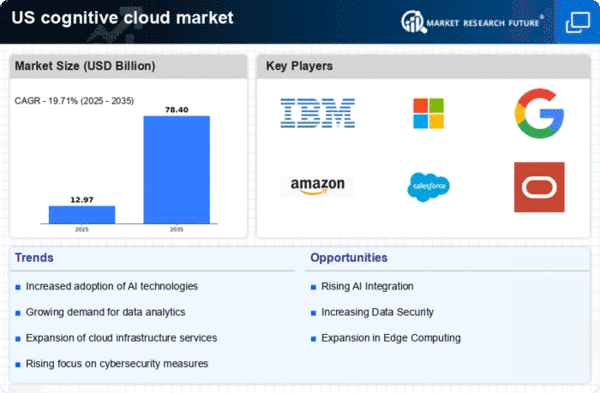Expansion of Cloud Infrastructure
The cognitive cloud market is significantly influenced by the ongoing expansion of cloud infrastructure across the United States. As organizations migrate to cloud-based solutions, the demand for cognitive capabilities integrated into these platforms is rising. The increasing availability of high-speed internet and advancements in cloud technologies are enabling businesses to leverage cognitive cloud solutions more effectively. Recent statistics indicate that the cloud services market in the US is expected to reach $500 billion by 2025, with cognitive services playing a crucial role in this growth. This expansion allows companies to harness vast amounts of data and apply cognitive analytics, thereby enhancing their operational capabilities and driving innovation within the cognitive cloud market.
Rising Demand for Intelligent Automation
The cognitive cloud market is experiencing a notable surge in demand for intelligent automation solutions. Organizations across various sectors are increasingly seeking to enhance operational efficiency and reduce costs through automation. This trend is driven by the need to streamline processes and improve decision-making capabilities. According to recent data, the market for intelligent automation is projected to grow at a CAGR of approximately 30% over the next five years. As businesses recognize the potential of cognitive cloud technologies to facilitate automation, investments in these solutions are likely to increase, thereby propelling the cognitive cloud market forward. The integration of machine learning and natural language processing into cloud services is expected to further enhance the capabilities of automation tools, making them more accessible and effective for organizations of all sizes.
Advancements in Machine Learning Algorithms
The cognitive cloud market is being propelled by advancements in machine learning algorithms, which are becoming increasingly sophisticated and capable of processing large datasets. These advancements enable organizations to derive actionable insights from their data, enhancing decision-making processes. The integration of machine learning into cognitive cloud solutions allows for real-time analytics and predictive modeling, which are essential for businesses aiming to stay competitive. As machine learning technologies continue to evolve, the cognitive cloud market is expected to witness substantial growth, with estimates suggesting a potential increase in market size by over 25% in the next few years. This evolution is likely to attract more organizations to adopt cognitive cloud solutions, thereby expanding the market.
Growing Focus on Enhanced Customer Experience
In the cognitive cloud market, there is a growing emphasis on enhancing customer experience through personalized services and solutions. Organizations are increasingly utilizing cognitive technologies to analyze customer data and gain insights into preferences and behaviors. This trend is particularly evident in sectors such as retail and finance, where companies are leveraging cognitive cloud solutions to tailor their offerings. Research suggests that businesses that prioritize customer experience can achieve revenue growth of up to 10% more than their competitors. As a result, the cognitive cloud market is likely to see increased investment in tools that facilitate customer engagement and satisfaction, further driving its expansion.
Increased Investment in Research and Development
The cognitive cloud market is benefiting from increased investment in research and development (R&D) by both established companies and startups. This influx of funding is aimed at innovating and enhancing cognitive cloud technologies, making them more efficient and user-friendly. As organizations recognize the strategic importance of cognitive capabilities, they are allocating more resources to R&D initiatives. Recent data indicates that R&D spending in the technology sector is projected to grow by 15% annually, with a significant portion directed towards cognitive cloud solutions. This trend suggests that the cognitive cloud market will continue to evolve rapidly, driven by innovations that meet the changing needs of businesses and consumers alike.
















